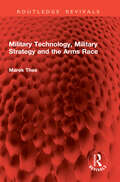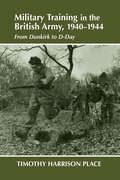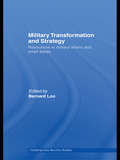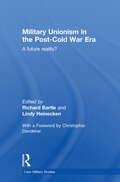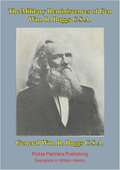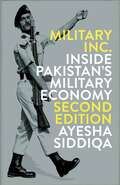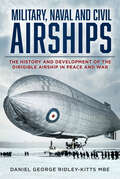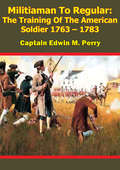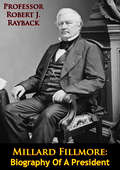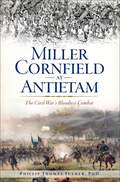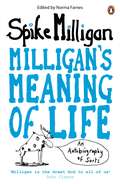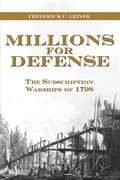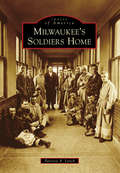- Table View
- List View
Military Technology, Military Strategy and the Arms Race (Routledge Revivals)
by Marek TheeFirst published in 1986, Military Technology, Military Strategy and the Arms Race argues that a principal factor contributing to the arms race is the military research and development (R and D) sector. It traces the arms race since World War II and explores the relationship between the emergence of new weapon technology, the development of new weapon systems and their impact on strategic thinking. It considers the positions for both the United States and its allies in NATO and for the erstwhile Soviet Union. It argues that military R and D, which consumes an increasing proportion of total funds spent on R and D has developed a self-sustaining technological momentum, which is baked by a powerful military -industrial -bureaucratic- technological complex and is increasingly out of control of political leaders.The book argues that negotiations to limit the numbers of weapons fail to address the main problem, and that more emphasis should be given to considering ways of limiting and controlling military R and D. It concludes by proposing a radical shift in policy to achieve this. This historical reference work is important for scholars and researchers of military studies, defence studies, international relations, diplomacy and international politics.
Military Thought of Asia: From the Bronze Age to the Information Age (Warfare and History)
by Kaushik RoyMilitary Thought of Asia challenges the assertion that the generation of rational secular ideas about the conduct of warfare is the preserve of the West, by analysing the history of ideas of warfare in Asia from the ancient period to the present. The volume takes a transcontinental and comparative approach to provide a broad overview of the evolution of military thought in Asia. The military traditions and theories which have emerged in different parts of Eurasia throughout history are products of geopolitics and unique to the different regions. The book considers the systematic and tight representation of ideas by famous figures including Kautlya and Sun Tzu. At the same time, it also highlights publications on military affairs by small men like mid-ranking officers and scattered ideas regarding the origin, nature and societal impact of organised violence present in miscellaneous sources like coins, inscriptions, paintings and fictional literature. In so doing, the book fills a historiographical gap in scholarship on military thought, which marginalises Asia to the part of cameo, and historicises the evolution of theory and the praxis of warfare. The volume shows that the ‘East’ has a long unbroken tradition of conceptualising war and its place in society from the Classical Era to the Information Age. It is essential reading for those interested in the evolution of military thought throughout history, particularly in Asia.
Military Training in the British Army, 1940-1944: From Dunkirk to D-Day (Military History and Policy #No. 6)
by Dr Timothy Place Timothy Harrison PlaceIn this study, the author traces the reasons for the British Army's tactical weakness in Normany to flaws in its training in Britain. The armour suffered from failures of experience. Disagreements between General Montgomery and the War Office exacerbated matters.
Military Transformation and Strategy: Revolutions in Military Affairs and Small States (Contemporary Security Studies)
by Bernard LooThis book explores the idea of arevolution in military affairs (RMA), which underpins the transformational agenda of the US military, and examines its implications for smaller states.The strategic studies literature on the RMA tends to be American-centric and directed towards the strategic problems of the US military. This volume seeks to fill t
Military Transition For Dummies
by Angie Papple JohnstonConquer civilian life after the serviceYou’ve served your country proudly. Now it’s time to discover all the things your country can do for you! In Military Transition For Dummies, you’ll learn how to tackle civilian life from a tactical standpoint, head on and full bore. Find out how to set yourself up for success before you leave the service and what to do when you land in the civilian world. Whether your sights are set on re-entering the workforce or you’re aiming to go back to school, this book walks you through each step of the way.Inside…Prepare for your separationFind your place as a civilianAccess veteran resourcesPerfect your resumeConquer job interviewsFind a great job or schoolManage your money wiselyGet the support you need
Military Unionism In The Post-Cold War Era: A Future Reality? (Cass Military Studies)
by Lindy Heinecken Richard BartleThis unique study of military unionism shows how the changing nature of present day conflicts has made soldier representation more important then ever. This new collection of essays clearly establish the key factors in the military union debate in recent years and highlight the mechanisms different armed forces have created to deal with the aspirations of their members. Core issues covered include: the nature of organizational and force restructuring since the end of the Cold War the new structures of military employment changes in value systems, such as rising individualism and the new culture of recruits legal, political, social and economic factors driving the debate. Placing military unionism in comparative perspective, these chapters provide the reader with an excellent basis for the examination of international military unionism from the viewpoint of countries with no unions, those recently unionised and those unionised for some time. This new book will be of great interest to students, researchers and professionals in military studies, defence management and sociology of the armed forces.
Military Veteran Psychological Health and Social Care: Contemporary Issues
by Jamie Hacker HughesWhen servicewomen and men leave the armed forces, their care transfers to the statutory and third sector where the quality and provision of services can vary enormously. This edited book, encompassing a range of perspectives, from service user to professional, provides a comprehensive overview of services available. Each chapter, in turn, examines the policy underpinnings of systems and services covering the psychological health and social care of military veterans and then focuses on the needs of a discrete number of types of military veterans including early service leavers, veterans in the criminal justice system, older veterans and reservists, together with the needs of the children of veterans’ families. This is the first UK book to examine the whole spectrum of contemporary approaches to the psychological health and social care of military veterans both in the United Kingdom and overseas. The book is edited by Professor Jamie Hacker Hughes, a former head of healthcare psychology within the UK Ministry of Defence and all contributors are experts in policy, service provision and academic research in this area. It will be of special interest to those designing and planning, commissioning, managing and delivering mental health and social care to military veterans and their families
Military in America: From the Colonial Era to the Present
by Peter M. KarstenNewly revised and expanded, this penetrating book goes beyond battles and strategies to examine the character and development of the American military establishment and its crucial relationship to the general society. Chronologically grouped into nine historical periods, over forty articles - including a rich and enlightening introductory essay, new primary sources, and interpretative pieces - span 200 years of military history from colonial times to today. Interweaving sociological and historical perspectives, Peter Karsten probes the following provocative topics: the debate over whether the military reflects or shapes society; the nature of combat and its emotional effects on servicemen; the recruitment, training, and socialization of military personnel; public attitudes toward military systems and military attitudes toward the public; the development of interservice rivalries; the draft vs. All-Volunteer Force; racial relations in the armed services; political lobbying and the military; and much more. This new edition also contains recent material devoted to Vietnam and its impact on current military conditions.
Military reminiscences of Gen. Wm. R. Boggs, C.S.A. [Illustrated Edition]: introduction and notes by William K. Boyd
by General William Robertson Boggs William Kenneth BoydIncludes Civil War Map and Illustrations Pack - 224 battle plans, campaign maps and detailed analyses of actions spanning the entire period of hostilities.General Boggs was a native of Georgia and after much service as an engineer in the pre-war army resigned his command when his home state succeeded from the Union. He was appointed to organize defences, purchase arms and complete defences, serving in South Carolina, Georgia and Trans-Mississippi theaters. An upright passionate man, his memoirs are peppered with accounts of his forthright disagreements with his superiors. He also comments on his attempts to combat the inertia of the Confederate bureaucracy, which were often in vain, and his opposition to the pilfering and plundering that dogged the war efforts.This book offers a fascinating insight into the disagreements that dogged the Confederate effort in the Western theater of operations during the Civil War.Author -- Boggs, William Robertson, 1829-1911.Introduction by -- Boyd, William Kenneth, 1879-1938.Text taken, whole and complete, from the edition published Durham, N. C., The Seeman printery, 1913.Original Page Count - xxiii and 115 pages.
Military, Inc.: Inside Pakistan's Military Economy
by Ayesha SiddiqaPakistan occupies a paradoxical, even contradictory place in American foreign policy. Nominally a strategic ally in the war on terror, it is the third-largest recipient of US aid in the world. At the same time, it is run by its military and intelligence service—whose goals certainly do not always overlap with US priorities. <P><P> This book offers a close look at what the rise of the military has meant for Pakistani society. Ayesha Siddiqa shows how entrenched the military has become, not just in day-to-day governance, but in the Pakistani corporate sector as well. What are the consequences of this unprecedented merging of the military and corporate sectors? What does it mean for Pakistan’s economic development—let alone for hopes of an eventual return to democracy and de-militarization? <P><P>This new edition brings Siddiqa’s account fully up to date with a new preface and conclusion that emphasize the changing role of the media.
Military, Naval and Civil Airships Since 1783: The History and Development of the Dirigible Airship in Peace and War
by Daniel G. Ridley-KittsExploring the history and development of the dirigible airship from its humble beginnings in the late eighteenth century, through to its current role as military command posts among other uses, this book is a comprehensive account of the dirigible airship.Starting out as an unreliable experimental aircraft as aeronauts first began to learn the secrets of aerial navigation, the airship was then remodelled in 1900 by Count Zeppelin to become a potent weapon of war then transformed again into a short-lived solution to long-distance passenger air travel. With over 100 technical drawings and contemporary images of dirigible aircraft, Ridley-Kitts here presents a comprehensive and fascinating history of the airship – a must read for those that wish the delve into the development of the aircraft for the first time and for airship specialists alike.
Military, State, and Society in Israel: Theoretical and Comparative Perspectives
by Daniel MamanThere have been many books on the place of war, security, or military service in Israeli society. The Military, State, and Society in Israel makes contributions to the debate-theoretical, empirical, and polemical-that are related to the Israeli case and to wider debates about the place of war and the military in contemporary industrialized societies. The Israeli case is important in the development of more macro approaches to the study of "things military" as war has played a central role in Israel's history and continues to do so. The book encapsulates in a very explicit manner tensions in the relationships between the military, state, and society and stands at the core of contemporary debates between two fundamental approaches to the study of the relations between the military society and the state: the "armed forces and society" school and the "state-making and war" perspective.Contemporary Israel is the site of debates about many of the fundamental assumptions that have undergirded the Jewish nation-state: the ethnic character of nationhood and statehood; the role of the Jewish diaspora vis-Ó-vis Israel; the legitimacy of Jewish "ethnic pluralism"; the meaning of the Holocaust; privatization of social life and the spread of consumerism; and weakening of the centralized state as the agent of social transformation affecting housing, language, health, technology, production, dress, and child-rearing. One important consequence of these internal conflicts and struggles has been a significant erosion in the almost sacred status once enjoyed by state institutions, and especially the military, among the majority of Jewish population."Theoretical and Comparative Perspectives," situates Israel in its wider theoretical and comparative context and shows how the study of Israel contributes to the theoretical understanding of contemporary changes in civil-military relations. "The Politics of Civil-Military Relations," concentrates on current changes in Israeli politics, the character of the conflict with the Palestinians, and the place of military in society. "The State and War-Making-Creating Citizens, Soldiers, and Men and Women," indicates how war and the military are not only instruments for state-making, but are also important factors in the formation of individual identities. "The Notion of 'National Security'-Institutions and Concepts," raises the basic question of whether the institutional mechanisms and the strategic conceptions crystallized during the first 50 years of Israel's existence are still relevant in a changing post-cold war world. "The Armed Forces as Organization, Continuity and Change," focuses on the lines of continuity and trends of change in several aspects of the Israeli Defense Forces' internal organizational structure.Studies based on Israeli cases, data, and scholarship have been central to the development of expertise in such fields as applied psychology and psychotherapy. This volume contributes to these areas of study, and will be of central importance to professionals interested in civil-military.
Military-to-Civilian Career Transition Guide: The Essential Job Search Handbook for Service Members (Second Edition)
by Janet I. FarleyThis handbook provides a career transition framework for service members and their families. Readers are given exit strategies for gracefully leaving the military; charts, checklists, and worksheets for planning each transition aspect; resume and cover letter samples and strategies; and interviewing and salary negotiation tips.
Militia Order in Afghanistan: Guardians or Gangsters? (Contemporary Security Studies)
by Matthew P. DearingThis book offers a new insight into when and why paramilitary groups in Afghanistan engage in protective or predatory behavior against the civilians they purportedly defend. In Afghanistan’s counterinsurgency environment, America leaned on militias to provide order and stabilize communities cut off from weak central government institutions. However, the lucrative market of protection challenged militia loyalty, as many engaged in banditry, vendettas, and predation. This book examines the varying militia experiments in Afghanistan from 2001 to 2020 and their outcomes through three sub-national case studies. It argues that successful militia experiments in Afghanistan involved inclusion of local orders, where communities had well-established social structures and accountability mechanisms in place, and state patrons relied upon those structures as a restraint against militia behavior. Complementary management ensured patrons leaned on communities for strong accountability systems. But such environments were far from the norm. When patrons ignored community controls, militias preyed on civilians as they monopolized the market of protection. This book adds to the rich literature on the U.S. experience in Afghanistan, but differs by focusing on the interplay between states, communities, and militias. This book will be of much interest to students of military and strategic studies, Asian politics, security studies and International Relations.
Militiaman To Regular: The Training Of The American Soldier 1763 – 1783
by Captain Edwin M. PerryThe militiaman of 1775 evolved into the regular soldier of 1783 because Americans changed their perception as to what constituted military preparedness. Political pamphlets and religious sermons had readied the colonists emotionally and intellectually to take up arms against the British. But their militia's training which stressed musket drill was inadequate and prepared them only for battle. During 1776 and 1777 Washington attempted to correct the soldiers' deficiencies and used his General Orders to train the Continental Army for war. After 1778 Washington was assisted by Steuben, who as the army's Inspector General stressed uniformity in drill and maneuver, as well as emphasizing the maintenance of equipment. Steuben's and Washington's efforts transformed the soldiers of the Continental Army into competent professionals who were able to engage successfully their European counterparts in battle while sustaining themselves in a war.
Millard Fillmore: Biography Of A President (Signature Ser.)
by Robert J. RaybackProfessor Robert J. Rayback's history of Millard Fillmore is still the best biography of the 13th President of the United States. In one of the many unexplained, unfortunate quirks of history, most of the official papers of Fillmore's administration were destroyed by his son. Scholars have consequently been denied the source material which is so essential to examining and gaining insight into the underlying truth of a Presidency. Regarding Fillmore, the few records that do survive can only be compiled piecemeal, a laborious task which few have had the stamina to undertake. Thus is the historical importance of Robert J. Rayback's authoritative biography, which gives documented substance to Fillmore and his three years in office. Thoughtful and objective, Rayback's balanced portrayal lauds Fillmore's astuteness, as in sending Matthew Perry to open Japan to trade, and assays his faults, such as agreeing to run on the "Know Nothing" ticket in 1856. We see, as John Lord O'Brian, former regent of the University of the State of New York noted, "a devoted patriot who in all activities sought guidance from his own conscience during the critical events of the mid-nineteenth century." Julius Pratt of the University of Buffalo concludes from the book that "without Fillmore there could have been no Lincoln."-Print ed.
Millennial Violence: Past, Present and Future (Political Violence Ser.)
by Jeffrey KaplanThis volume encompasses an array of material exploring the millennium phenomenon and the violent excitement it provokes. Consisting of three core parts, the book combines pertinent documents with insightful commentary and discussion.
Millennialism and Violence
by Michael BarkunAs the world approaches the year 2000, many societies are experiencing an unprecedented growth in millenarian movements that anticipate an imminent and total transformation of the world. Many of these movements have been associated with violence, either as a means for producing change or as a response to confrontations with state authority. This book draws together research on this topic from political science, psychology, sociology and history in an attempt to understand the relationship between millenarian movements and episodes of violence.
Millennium: Fall of Terok Nor/War of the Prophets/Inferno (Star Trek #Vol. 1)
by Judith Reeves-Stevens Garfield Reeves-StevensWelcome, Emissary. As Benjamin Sisko picked his way over the wreckage that was his new command, a thousand questions, countless problems, dire reports, and the soon-to-be-familiar harangue of the Bajoran Liaison Officer clamored for his attention. From the shadows, a monk stepped out and greeted him. With all that had happened, it is no small wonder that Sisko took that greeting and relegated it to the back of his mind. Six years have passed. Despite the recent retaking of Deep Space 9 , it seems that the Federation is losing the Dominion war. As commander of a front-line post, Sisko focuses on the war effort, paying little attention to the latest rumor. "The fabled lost Orbs of the Prophets have been recovered. Legend holds that these orbs are the key to unlocking a second wormhole -- a second Celestial Temple." In war, sometimes the little things you don't notice are your undoing. Now Benjamin Sisko, a man of science and a Starfleet officer -- and also the Emissary -- is swept up in the ultimate war of good versus evil. Every decision he makes draws him, his family, and his crew into the abyss. Faced with the possibility that he alone must decide the fate of life in the galaxy, Captain Sisko must unlock the truth behind the fabled Orbs of the Prophets or the future, the past, and even the present will wink out of existence!
Miller Cornfield at Antietam: The Civil War's Bloodiest Combat (Civil War Series)
by Philip Thomas TuckerAuthor Phillip Thomas Tucker reveals the triumph and tragedy of the greatest sacrifice of life of any battleground in America.On September 17, 1862, the forces of Major General George B. McClellan and his Union Army of the Potomac confronted Robert E. Lee's entire Army of Northern Virginia at the Battle of Antietam in Sharpsburg, Maryland. The Union forces mounted a powerful assault on Lee's left flank in the idyllic Miller Cornfield. It was the single bloodiest day in the history of the Civil War. The elite combat units of the Union's Iron Brigade and the Confederate Texas Brigade held a dramatic showdown and suffered immense losses through vicious attacks and counterattacks sweeping through the cornstalks.
Milligan's Meaning of Life: An Autobiography of Sorts
by Spike MilliganSpike Milligan's legendary war memoirs are a hilarious and subversive first-hand account of the Second World War, as well as a fascinating portrait of the formative years of this towering comic genius, most famous as writer and star of The Goon Show. They have sold over 4.5 million copies.With his lightning-quick wit, unbridled creativity and his ear for the absurd, Milligan revolutionised British comedy, leaving a legacy of influence that stretches from Monty Python's Flying Circus to the work of self-confessed acolytes such as Eddie Izzard and Stephen Fry today.Throughout his life, Milligan wrote prolifically - scripts, poetry, fiction, as well as several volumes of memoir, in which he took an entirely idiosyncratic approach to the truth. In this ground-breaking work, Norma Farnes, his long-time manager, companion, counsellor and confidante, gathers together the loose threads, reads between the lines and draws on the full breadth of his writing to present his life in his own words: an autobiography - of sorts.From his childhood in India, through his early career as a jazz musician and sketch-show entertainer, his spells in North Africa and Italy with the Royal Artillery, to that fateful first broadcast of The Goon Show and beyond into the annals of comedy history, this is the autobiography Milligan never wrote.
Millionaire's Last Stand (Small-Town Scandals #1)
by Elle KennedyMind-blowing suspense and heart-melting passion propel the first romance in the Small-Town Scandals series from the New York Times–bestselling author.There are plenty of people in Serenade with motive to murder Teresa Donovan. But no one doubts that her estranged husband, Cole, killed her. No one except FBI profiler Jamie Crawford. Though their electrifying attraction threatens her objectivity, Jamie’s unerring gut tells her the magnetic tycoon is innocent.Cole’s disastrous marriage has shattered his trust. But in Jamie’s alluring presence, his protective armor melts away. Now, as their mutual fascination ignites into a mind-melting attraction, a killer is targeting Jamie. And Cole will risk anything to protect the woman who’s restored his shattered heart . . .
Millions for Defense
by Frederick C LeinerThe title of this book comes from a toast popular with Americans in the late 1790s-"millions for defense, not a cent for tribute." Americans were incensed by demands for bribes from French diplomats and by France's galling seizures of U.S. merchant ships, and as they teetered towards open war, were disturbed by their country's lack of warships. Provoked to action, private U.S. citizens decided to help build a navy. Merchants from Newburyport, Massachusetts, took the lead by opening a subscription to fund a 20-gun warship to be built in ninety days, and they persuaded Congress to pass a statute that gave them government "stock" bearing 6 percent interest in exchange for their money.Their example set off a chain reaction down the coast. More than a thousand subscribers in the port towns pledged money and began to build nine warships with little government oversight. Among the subscription ships were the Philadelphia, later lost on the rocks at Tripoli; Essex, the first American warship to round the Cape of Good Hope; and Boston, which captured the French corvette Le Berceau.This book is the first to explore in depth the subject of subscribing for warships. Frederick Leiner explains how the idea materialized, who the people were who subscribed and built the ships, how the ships were built, and what contributions these ships made to the Quasi-War against France. Along the way, he also offers significant insights into the politics of what is arguably the most critical period in American history.
Milspouse Strength: Changing the Way You See and Respond to Military Life Stress
by Kendra LoweMilitary spouses: Transform your military life stress into strength! "... a must-read for military spouses ... to learn and understand the circumstances and harm of stress, the outcome and capabilities of the mind, and the tools, questions, and reflections to manage through it all."—Sabina W. Zarlenga, MS, LPCC, NCC, CCTP, Army spouse Do you feel like you are constantly adjusting your life over and over again? As if the underlying stress of your service member's dangerous missions or the lengthy separations during deployments aren't enough. Each new assignment brings another relocation, potential job search, school changes, and more. It's easy to feel overwhelmed and believe that a life of constant stress is the norm for military spouses. But cumulative stress hugely impacts your life! In Milspouse Strength, author Kendra Lowe, a veteran, military spouse, and trained psychologist, helps you understand the impact of both positive and negative stress, healthy ways to respond to stressful situations, and ultimately how to transform your stress into strength. The information, tools, and reflection questions will help you break down the individual stresses that weigh on your mind so you can feel in control of your life right now and develop the skills to change the way you see and respond to military life stress. "Truly outstanding! ... Kendra captures the true essence of being a military spouse: the challenges, the resilience, the stress, and the rewards. She then goes on to give tangible information to deal with the stress successfully." —Robyn Grable, US Navy veteran, military spouse, CEO of Veterans ASCEND Features: • Information about different types of stress • Tools for assessing stress levels and their impact • Stories and perspective from other military spouses • Reflection questions in each chapter Encouraging ~ Informative ~ All Service Branches
Milwaukee's Soldiers Home (Images of America)
by Patricia A. LynchAs the country sought healing and peace after the Civil War, Wisconsin citizens took up Pres. Abraham Lincoln's challenge "to care for him who shall have borne the battle." Their efforts paved the way for the establishment in Milwaukee of one of the original three branches of the National Asylum for Disabled Volunteer Soldiers. In May 1867, the first 60 veterans, including a musician from the War of 1812, moved to a single building on 400 rolling acres west of Milwaukee. By the end of the 19th century, the bustling campus boasted its own hospital, chapel, library, theater, and recreation hall, in addition to the grand main building. Subsequent wars and military conflicts created a need for additional buildings and services. Designated a National Historic Landmark in 2011, the campus continues to offer a healing environment for today's patients and stands as a testimony to advances in veteran health care.
